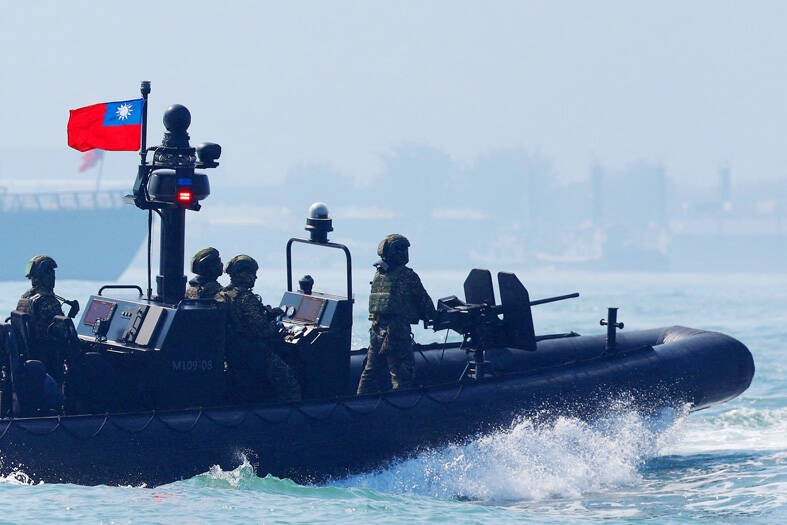Democratic Progressive Party (DPP) lawmakers have proposed an amendment to toughen penalties for military officials found guilty of treason.
Current punishments are too lenient and do not serve as a deterrent, legislators told a meeting of the Legislative Yuan’s Foreign Affairs and National Defense Committee yesterday, citing the case of former army colonel Hsiang Te-en (向德恩).
Hsiang was found guilty of accepting bribes and signing a letter of surrender swearing allegiance to the People’s Republic of China as his “motherland.” The Kaohsiung District Court in February last year sentenced him to seven-and-a-half years in prison and ordered him to pay NT$560,000, the equivalent of what he received in bribes.

Photo: Carlos Garcia Rawlins, Reuters
DPP legislators Wang Ting-yu (王定宇), Michelle Lin (林楚茵) and Chen Kuan-ting (陳冠廷) proposed increasing the sentences for military officials found guilty of treason from the current one to seven years in prison to three to 10 years.
In Hsiang’s case, the Ministry of National Defense initially suggested that he be tried for contravening Articles 17 and 19 of the Criminal Code of the Armed Forces (陸海空軍刑法), the legislators said.
“However, the Kaohsiung District Prosecutors’ Office, which handled the case, only tried Hsiang for the crime of corruption, for which there was clear evidence,” they said.
“China’s efforts to infiltrate Taiwan are becoming an increasingly serious problem, but espionage cases are tried too leniently, and that poses a national security risk,” they added.
Although Hsiang’s willingness to surrender to China would affect troop morale, current laws do not stipulate penalties for such acts committed during peacetime, the legislators said.
“If active-duty military personnel can freely commit such violations of their sworn loyalty to the nation, it would be difficult to prevent defection and enemy infiltration in wartime,” the legislators said.
Penalties for crimes related to aiding an enemy in the Criminal Code of the Armed Forces should be revised with reference to provisions for the crime of foreign aggression in the Criminal Code, the legislators said.
Specifically, stricter penalties should be implemented for those who “prepare or conspire to deliver military facilities or items to the enemy, engage in espionage activities for the enemy, or assist the enemy’s spies to engage in such activities,” the legislators said.
The proposed amendment would also increase prison terms to up to seven years for those who intend to destroy military facilities and items, damage or block water and land routes, give the enemy a military advantage, harm Taiwan or its allies through actions that would put their respective militaries at a disadvantage, or surrender to the enemy, the legislators said.

The US government has signed defense cooperation agreements with Japan and the Philippines to boost the deterrence capabilities of countries in the first island chain, a report by the National Security Bureau (NSB) showed. The main countries on the first island chain include the two nations and Taiwan. The bureau is to present the report at a meeting of the legislature’s Foreign Affairs and National Defense Committee tomorrow. The US military has deployed Typhon missile systems to Japan’s Yamaguchi Prefecture and Zambales province in the Philippines during their joint military exercises. It has also installed NMESIS anti-ship systems in Japan’s Okinawa

‘WIN-WIN’: The Philippines, and central and eastern European countries are important potential drone cooperation partners, Minister of Foreign Affairs Lin Chia-lung said Minister of Foreign Affairs Lin Chia-lung (林佳龍) in an interview published yesterday confirmed that there are joint ventures between Taiwan and Poland in the drone industry. Lin made the remark in an exclusive interview with the Chinese-language Liberty Times (the Taipei Times’ sister paper). The government-backed Taiwan Excellence Drone International Business Opportunities Alliance and the Polish Chamber of Unmanned Systems on Wednesday last week signed a memorandum of understanding in Poland to develop a “non-China” supply chain for drones and work together on key technologies. Asked if Taiwan prioritized Poland among central and eastern European countries in drone collaboration, Lin

The Chien Feng IV (勁蜂, Mighty Hornet) loitering munition is on track to enter flight tests next month in connection with potential adoption by Taiwanese and US armed forces, a government source said yesterday. The kamikaze drone, which boasts a range of 1,000km, debuted at the Taipei Aerospace and Defense Technology Exhibition in September, the official said on condition of anonymity. The Chungshan Institute of Science and Technology and US-based Kratos Defense jointly developed the platform by leveraging the engine and airframe of the latter’s MQM-178 Firejet target drone, they said. The uncrewed aerial vehicle is designed to utilize an artificial intelligence computer

Renewed border fighting between Thailand and Cambodia showed no signs of abating yesterday, leaving hundreds of thousands of displaced people in both countries living in strained conditions as more flooded into temporary shelters. Reporters on the Thai side of the border heard sounds of outgoing, indirect fire yesterday. About 400,000 people have been evacuated from affected areas in Thailand and about 700 schools closed while fighting was ongoing in four border provinces, said Thai Rear Admiral Surasant Kongsiri, a spokesman for the military. Cambodia evacuated more than 127,000 villagers and closed hundreds of schools, the Thai Ministry of Defense said. Thailand’s military announced that